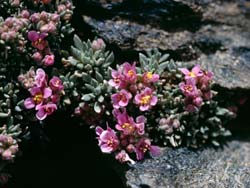Climate change is altering mountain vegetation at large scale

This alpine species (Nevadensia purpurea) could disappear from some European mountains in the next few decades. Credit: Harald Pauli<br>
Led by researchers from the Austrian Academy of Sciences and the University of Vienna, biologists from 13 different countries in Europe analysed 867 vegetation samples from 60 different summits sited in all major European mountain systems, first in 2001 and then again just seven years later in 2008. They found strong indications that, at a continental scale, cold-loving plants traditionally found in alpine regions are being pushed out of many habitats by warm-loving plants.
“We expected to find a greater number of warm-loving plants at higher altitudes, but we did not expect to find such a significant change in such a short space of time,” said Michael Gottfried from the Global Observation Research Initiative in Alpine Environments (GLORIA) programme which coordinated the study. “Many cold-loving species are literally running out of mountain. In some of the lower mountains in Europe, we could see alpine meadows disappearing and dwarf shrubs taking over within the next few decades,” he warns.
The study, which is the largest and most comprehensive of its kind in the world, confirmed that there is a direct link between growing summer temperature and the shift in alpine plant composition. “While regional studies have previously made this link, this is the first time it has been shown on a continental scale,” said Gottfried. This phenomenon, which the GLORIA researchers have called thermophilization, has now been measured and quantified for the first time and is expressed by the researchers as a thermophilization indicator (D). All 32 of the study's authors used exactly the same sampling procedures and returned to the same sampling sites, thus enabling a pan-continental comparison to be made for the first time. “We hope that our thermophilization indicator could be used by other research groups around the world and enable a global comparison,” said Harald Pauli, GLORIA's network coordinator.
The research also showed that the effect is independent of altitude (it is happening at the tree line as well as on high mountain peaks) and latitude (the effect is seen in northern countries such as Scotland as well as southern mountain ranges such those on Crete).
“Our work shows that climate change affects even the outer edges of the biosphere,” said Georg Grabherr, chair of the GLORIA programme. “The thermophilisation of alpine life zones can never be controlled directly. Adaptation strategies are not an option and we must concentrate on mitigating climate change in order to preserve our biogenetic treasure.”
About GLORIA
The GLORIA programme (Global Observation Research Initiative in Alpine Environments) is a network of more than 100 research teams distributed over six continents whose aim it is to monitor all alpine regions across the globe. Launched in 2001, it has implemented a long-term and standardised approach to the observation of alpine vegetation and its response to climate change. The GLORIA researchers will be returning to the same European sampling sites in 2015 to continue monitoring the effects of climate change on alpine vegetation.
Further details: http://www.gloria.ac.at/
Publication
Continent-wide response of mountain vegetation to climate change. In: Nature Climate Change, 8. Jänner 2012 (Online ahead of print) DOI: 10.1038/NCLIMATE1329
Media Contact
More Information:
http://www.univie.ac.atAll latest news from the category: Ecology, The Environment and Conservation
This complex theme deals primarily with interactions between organisms and the environmental factors that impact them, but to a greater extent between individual inanimate environmental factors.
innovations-report offers informative reports and articles on topics such as climate protection, landscape conservation, ecological systems, wildlife and nature parks and ecosystem efficiency and balance.
Newest articles

Machine learning algorithm reveals long-theorized glass phase in crystal
Scientists have found evidence of an elusive, glassy phase of matter that emerges when a crystal’s perfect internal pattern is disrupted. X-ray technology and machine learning converge to shed light…

Mapping plant functional diversity from space
HKU ecologists revolutionize ecosystem monitoring with novel field-satellite integration. An international team of researchers, led by Professor Jin WU from the School of Biological Sciences at The University of Hong…

Inverters with constant full load capability
…enable an increase in the performance of electric drives. Overheating components significantly limit the performance of drivetrains in electric vehicles. Inverters in particular are subject to a high thermal load,…





















